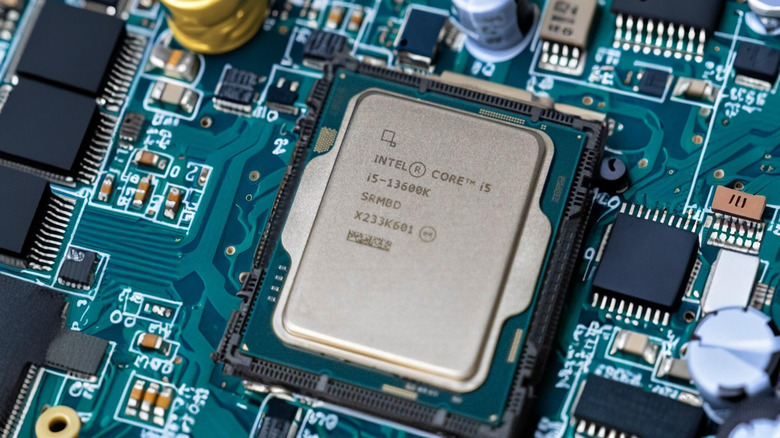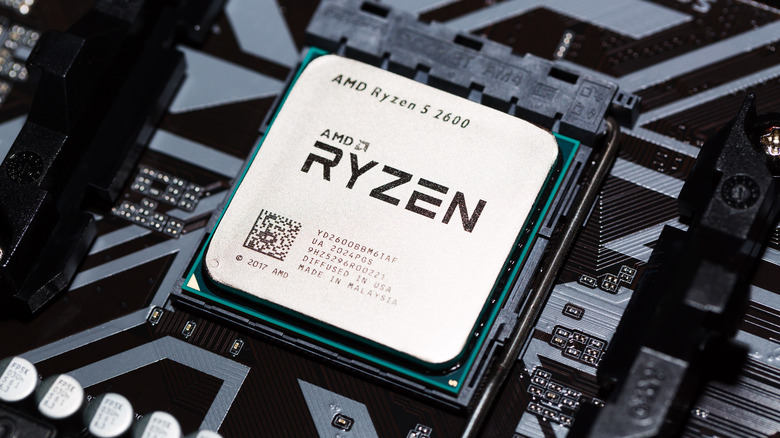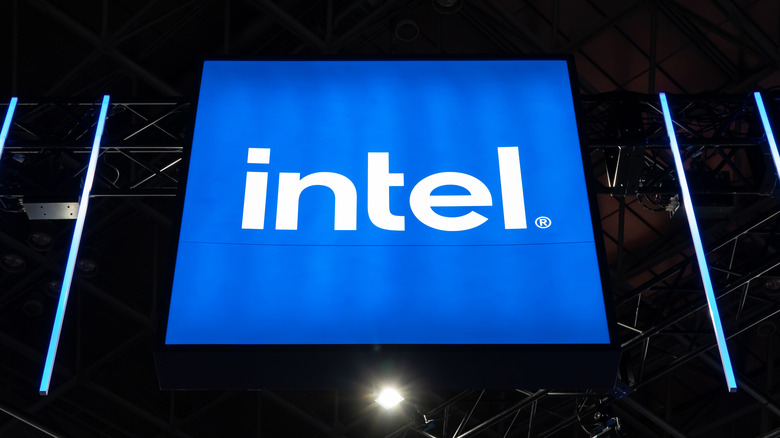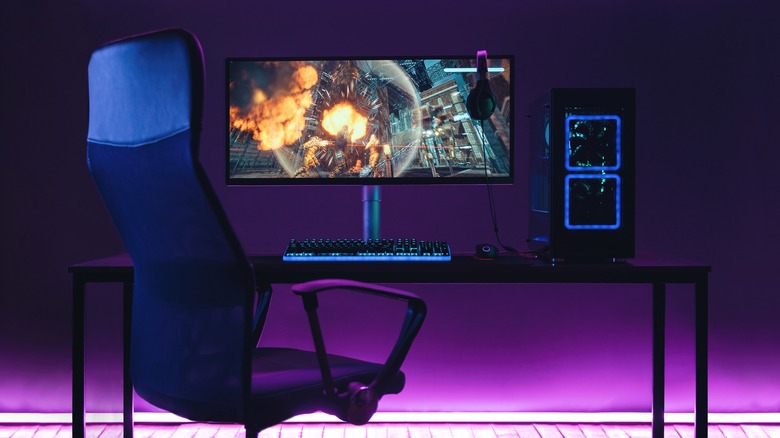AMD Vs Intel: How To Choose The Right CPU For Your PC?
We may receive a commission on purchases made from links.
The battle between AMD and Intel never comes to an end — after all, both brands are the top manufacturers of desktop and laptop processors, so it's no surprise. While Intel dominates in terms of market share, AMD is a popular choice among consumers, specifically gamers. But which one is better for your PC, and more importantly, which one should you pick? It's surprising how hard it is to find some unbiased opinions on this matter, but we'll walk you through the pros and cons of each manufacturer below to help you make an informed decision.
Researching the AMD vs. Intel situation is pretty tricky, all because each side has its own host of dedicated die-hard supporters. This can make PC-building communities unreliable (although they can also be very helpful at times). The truth is that for most use cases, whether you choose Intel or AMD, you'll be fine. However, PCs are expensive to buy or build, so if you want to make sure you're spending your money on the CPU (processor) that best fits your needs and offers the best value, it's a good idea to dig deeper and decide between the two.
AMD and Intel processors differ greatly on an architectural level, which affects their capabilities in various tasks. Let's examine these processors and find out what they're best suited for.
AMD: Lots of cache and future-proofing
AMD's had a bumpy road, but the last decade or so has been a wonderful time for the so-called Team Red. AMD managed to break through Intel's near-complete domination and carve out a niche for itself, and as it started releasing successful processors in the Ryzen range, it slowly became the go-to for many. AMD CPUs are typically cheaper than their Intel counterparts and have now long been a staple for budget-conscious PC gamers, but the price tag isn't the only thing that's solid about them.
AMD's current generation of processors offers excellent future-proofing. According to most reports, Intel will soon be switching to a new chipset while AMD's AM5 platform ensures that you'll be able to upgrade your processor a couple of times before needing to invest the money in a new motherboard (and, alongside that, possibly a new case, cooler, power supply, and who knows what else).
Apart from the longevity, the architecture of AMD chips is advantageous for gamers, and this especially applies to the X3D chips that come equipped with AMD's proprietary 3D V-Cache. This is a technology that involves stacking an additional layer of L3 cache directly on top of the processor's core. If that's too much tech-babble for you, the bottom line is that these CPUs have access to tech that can drastically improve their performance, especially in gaming settings.
If you're not much of a gamer, AMD also makes an interesting alternative to a CPU with built-in graphics: Accelerated Processing Units (APU). It's a type of processor that combines a CPU and a GPU in a single chip, offering graphics performance that can rival some discrete graphics cards.
Intel: A hybrid productivity workhorse
Where AMD has had an uphill climb, Intel has been basking in brand recognition for a long time now. As a result, these CPUs are easy to come by, but may often command higher prices — although this isn't such a universal truth anymore as it was just a few years ago. However, on the high-end, Intel does tend to push the prices, with the likes of the Core i9-14900KS being priced at over $700 at some retailers.
Intel CPUs often excel in productivity workloads. This is, in part, due to the hybrid core architecture that Intel has been employing since the Alder Lake generation of processors. Basically, each Intel processor now comes with two types of cores instead of just one, which is the way AMD makes them. These newer Intel CPUs have performance (P) cores and efficiency (E) cores. P-cores were designed for demanding computational tasks, and E-cores were optimized to run background processes and other less-intensive tasks.
The average Intel CPU sports more cores than AMD's counterparts. For instance, the aforementioned Core i9-14900KS comes with 24 cores and 32 threads, while AMD's top chip at the time of writing, the Ryzen 9 7950X3D, has 16 cores and 32 threads. Some Intel models are also able to push for higher frequencies, but this comes at the cost of increased power consumption.
Although the cache size in Intel processors has been increasing in recent years, AMD's use of 3D V-Cache and overall push for including bigger caches on its chips mean that Intel processors typically have smaller combined caches, with the Core i9-14900KS sporting 68MB of combined cache, whereas the Ryzen 9 7950X3D has a whopping 144MB.
AMD and Intel pros and cons
Having explored the way each CPU works and what it's capable of, let's zoom in a little bit and explore their pros and cons to help you make a decision between the two. Remember that depending on each CPU generation, these benefits and downsides may be different; for instance, older Intel CPUs didn't have that hybrid architecture, meaning that the productivity aspect may not be as affected.
The pros of Intel processors include:
- Higher core counts are good for productivity and multitasking
- High-end models may offer higher frequencies, which is good for single-threaded applications
- Mid-range chips sport lots of cores at reasonable prices
Now, for Intel's cons:
- Typically more expensive than their AMD counterparts, although this varies between generations
- Often consume more power than AMD chips
- No future-proofing even when buying the latest CPU, as Intel changes sockets every couple of generations
AMD marks the other side of the coin. Here are some of the pros of AMD processors:
- May offer a better price-to-performance ratio
- Generally lower power consumption
- Lots of cache makes gaming workloads a breeze
- The AM5 platform is still new, ensuring a steady upgrade path
On the other hand, some of the downsides include:
- May offer lower single-core performance than Intel
- Less suited to productivity
This bite-sized list of pros and cons is non-exhaustive and may not apply to each and every product release, but in general, this is where the AMD vs. Intel landscape is at right now. With that out of the way, which one should you get?
Which CPU is best for your PC?
If you're a casual user who doesn't try to squeeze every last bit of performance out of their PC, you may never notice the difference between comparable processors from AMD and Intel. However, if you're trying to optimize your build, the general rule of thumb is that AMD is the king in gaming, and Intel is a more well-rounded option for work and productivity purposes.
For instance, AMD's Ryzen 7 7800X3D processor is the fastest gaming CPU in the world, and I say this as someone who's tested that chip (as well as all the other CPUs in this article). The funny thing about the Ryzen 7 7800X3D is that it's faster in gaming than some of Intel's most expensive CPUs, such as the Core i9-14900K, all the while regularly priced at only $450.
On the Intel side, as a gamer, there's little to no use in getting anything better than an Intel Core i5-13600K or the follow-up Core i5-14600K. Both have plenty of cores and will do well in productivity tasks. While they're nowhere near as fast as the 7800X3D, they're all you need for gaming at maximum settings (as long as you also have a good graphics card). For high-end productivity workloads, the Core i9-14900K is your best bet, followed by the Ryzen 9 7950X for AMD.
If you're on a tight budget, both AMD and Intel have some excellent options. Look into the Core i3-12100F if you're more into Intel, and the Ryzen 5 5600 from AMD. Be mindful that the AMD option is locked to the AM4 platform, so for future-proofing, consider buying the Ryzen 5 7600X instead. Lastly, to save money and not have to buy a graphics card, this Ryzen APU is a good alternative.




